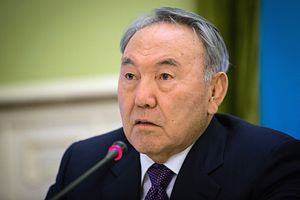In the last few months, the Obama administration has declared a new multi-pronged Central Asian strategy designed to advance U.S. interests in Eurasia in a novel era. The strategy has three main goals: strengthening security partnerships, forging closer economic ties; and advancing governance and human rights. The test case for this policy’s effectiveness lies in Kazakhstan, which is already the region’s economic powerhouse and aspires to join the ranks of the world’s most developed countries.
During the first decade (1991-2001) of Central Asia’s independence, the United States helped transform these former Soviet republics into independent nation states, free of Moscow’s domination and liberated from perverse Soviet economic and political practices. A related goal was to develop these country’s energy resources. After the September 2001 terrorist attacks, Washington prioritized counterterrorism and ensuring regional support for Afghanistan.
The Obama administration is now pursuing a balance of goals: national independence and sovereignty, counterterrorism, economic and energy development, constitutional government, and civil liberties. The new strategy recognizes that, while Caspian oil and gas remains important, far more is at stake for both the region and the U.S. than just “pipeline politics.” Other important U.S. interests include countering violent extremism, discouraging Russian revanchism, and promoting regional economic development in partnership with, but not subordination, to China.
Kazakhstan has made impressive economic and diplomatic progress since independence. It has achieved one of the most rapidly growing economies in the world and attracted more foreign investment than all the other countries of Central Asia combined. The government has invested heavily in education, healthcare, and other sectors critical for future national economic development. Furthermore, Kazakhstan has skillfully maintained atypical ethnic and religious harmony in a world replete with tensions in both domains.
The Kazakh government has made important contributions to promoting regional security, nuclear disarmament, and an open rather than closed form of regional integration. During the past year, for instance, Kazakhstan’s diplomats have played an active role in ending the conflicts in Syria and Afghanistan, promoting the nuclear dialogue with Iran, and developing tools to counter violent extremism.
The United States also benefits from Kazakhstan’s “multi-vector” foreign policy, which aims for cooperative relations with all major powers, promotes geopolitical pluralism, and resists the hegemonic ambitions of larger countries that would threaten Kazakhstan’s political or economic autonomy. In contrast to Moscow’s vision of a reconstituted Soviet-type economic bloc under Russian control or Beijing’s vision of a New Silk Road that would use Central Asia more as a conduit than a contributor, Astana has insisted on a Eurasian Union without political constraints and a Eurasian transcontinental corridor in which Central Asians would enjoy preeminent status in their region.
The United States was Kazakhstan’s close partner in developing the country’s energy resources. U.S. companies can further benefit through collaborating with Kazakhstan as the country pursues post-petroleum resources such as rare-earth metals. The government welcomes foreign investors to help develop these resources. Washington can aid this process by continuing to support Kazakhstan’s entry into the World Trade Organization.
In line with Kazakhstan’s commitment to countering nuclear weapons proliferation and promoting peaceful nuclear energy, this April the government approved an agreement with the International Atomic Energy Agency to establish a low-enriched uranium fuel bank in Kazakhstan. This step supports the U.S. goal of discouraging the spread of sensitive nuclear technologies that can be misused to make nuclear weapons.
U.S. President Barack Obama should attend the inauguration of this facility, thereby becoming the first U.S. President to visit post-Soviet Central Asia. In doing so he can remind the world of his administration’s contributions against nuclear terrorism, and discuss how the U.S. can continue to work with Kazakhstan and its neighbors to meet common challenges in coming years. As Deputy Secretary of State Antony Blinken noted earlier this year, “the Central Asian countries are very much looking to us for that [kind of high-level] engagement and we now just have to deliver on it.”
Kazakhstan’s development of modern representative institutions is advancing. At the Astana Economic Forum in May, Kazakhstani President Nursultan Nazarbayev launched a “100 steps” initiative that identifies the specific measures his government will take to improve Kazakhstan’s economic performance, national unity, public administration, rule of law, and government accountability and transparency.
The United States is clearly better positioned than Russia, China, or Iran to promote these economic, societal, and political reforms. The United States needs to encourage Kazakhstan to move toward a multi-party political system and build other strong democratic institutions as well as support its economic development and security. There is no greater assurance of a country’s long-term stability and security than this.
Messrs. Socor, Weitz, and Witt are experts on Central Asia. Vlad Socor is a Senior Fellow of the Washington-based Jamestown Foundation. Richard Weitz is a Senior Fellow and Director of the Center for Political-Military Analysis at Hudson Institute. Daniel Witt is President of the International Tax and Investment Center, also based in Washington, D.C.
*This article has been updated since it was first published.

































